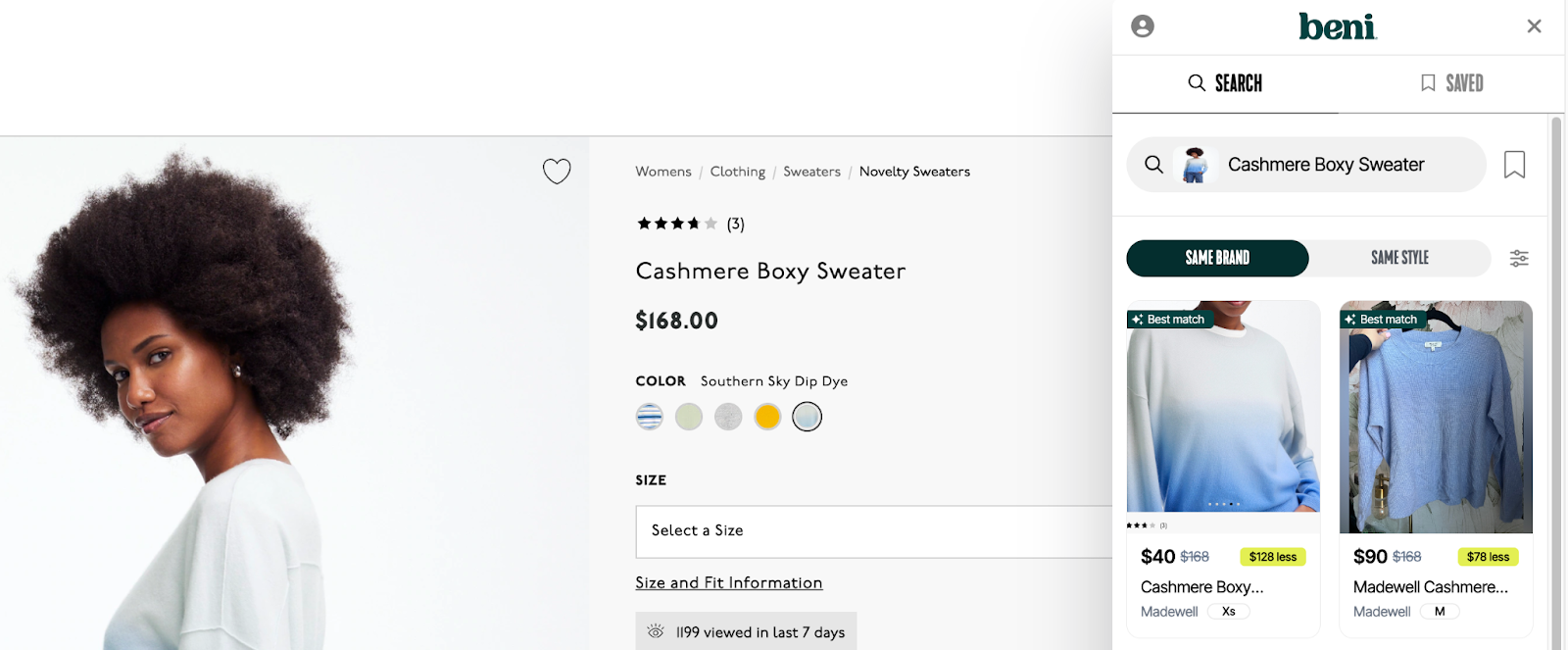Beni Revolutionizes Sustainable Fashion with Zilliz Cloud's Vector Search

75%
Reduction in infrastructure costs after migrating to Zilliz Cloud
200M+
Total active resale listings managed through the platform
1,000+
Fashion retail sites integrated into the recommendation engine
1M+
Daily listing updates processed in real-time
Zilliz Cloud enabled us to scale search while dramatically reducing our costs. Its hybrid search capabilities helped us achieve higher relevance for both text and image queries.
Celine Lightfoot
About Beni
Founded in 2021 by Sarah Pinner, Celine Lightfoot (CTO), and Kate Sanner (CEO), Beni is a pioneering startup revolutionizing sustainable fashion. Through its free browser extension and mobile app, Beni helps shoppers discover secondhand clothing and accessories at significant discounts.
Operating in the rapidly growing re-commerce market—projected to reach $82 billion by 2026—Beni caters to environmentally conscious Gen Z and Millennials. By promoting a circular economy in fashion, Beni empowers users to make sustainable choices and extend the lifespan of clothing.
Beni's platform goes beyond basic search by offering tailored product recommendations. When a shopper views an item, Beni’s advanced recommendation engine identifies and suggests similar secondhand options from its extensive database of over 200 million resale listings. These suggestions consider factors like style, brand, color, and material, ensuring relevance and variety.
This powerful recommendation system processes up to 20 queries per second, requiring robust infrastructure to deliver seamless user experiences. With Zilliz Cloud’s vector search capabilities, Beni ensures that users receive fast, accurate, and personalized results, streamlining the process of discovering high-quality secondhand items and making sustainable shopping easier and more accessible.

Challenges
Complex Search Requirements
Beni faced several challenges when trying to provide fast, relevant, and accurate search results. These challenges stemmed from the need to handle various types of data—text, images, and metadata—that differed in quality and consistency across multiple sources.
Inaccurate Product Descriptions: Traditional text-based search failed to provide accurate results due to inconsistent and incomplete metadata from resale marketplaces. Products with similar names or poorly described features often led to irrelevant results.
Variable Image Quality: Product images on different platforms had varying resolutions, perspectives, and lighting, making visual search a challenge. Beni needed a system that could interpret these differences and still deliver relevant results.
Subtle Product Differences: Clothing items often had minor differences—such as fabric patterns, stitching details, or slight color variations—that were difficult to capture using traditional keyword-based search methods.
Real-Time Updates: With 200 million vectors at 1,024 dimensions and 1 million daily updates, Beni needed a real-time system that could continuously rebuild its index to ensure the most accurate listings were available to users.
High Query Load: Beni’s platform needed to handle up to 20 queries per second (QPS) while maintaining low latency and high accuracy, ensuring users received personalized recommendations instantly.
Scale and Cost Constraints
Before migrating to Zilliz Cloud, Beni managed 200 million vectors using Milvus, the open-source vector database, hosted on their own Kubernetes Engines in GCP. While evaluating managed solutions, they compared Zilliz Cloud—the managed version of Milvus—with Google Vertex AI and found that Vertex AI was too costly for their slim-margin business model, making it unsustainable in the long term. Managing real-time updates at a rate of approximately 1 million per day required a highly scalable and cost-efficient infrastructure. To support their operational needs while staying true to their sustainability mission, Beni needed a more effective solution—and Zilliz Cloud delivered.
Solution
How Zilliz Cloud on GCP Solves These Challenges
Zilliz Cloud addresses these challenges in a scalable and cost-effective way. Here's how it works:
Text and Image Vectorization: Beni generates vector embeddings for both text descriptions and product images. This allows the system to understand the semantics behind words and images, rather than just matching keywords. For example, a red dress and a floral-patterned dress can be matched based on their similarity in appearance and description, even if their metadata is incomplete or inconsistent.
Hybrid Search Capabilities: By combining text-based and image-based embeddings, Beni’s search engine can process queries that contain both types of data (e.g., “red dress” with an image) and return results that are contextually more relevant.
Real-Time Index Updates: As new listings are added or updated, Zilliz Cloud’s real-time index rebuilding ensures that the search results always reflect the most current inventory, keeping up with the rapid turnover of products in the resale market.
Key Components
Zilliz Cloud, powered by Milvus, provided Beni with a scalable and serverless vector search solution capable of handling both text and image embeddings. By leveraging multi-modal embeddings, Beni significantly improved search relevance for hybrid queries, such as combining textual inputs like "red floral dress" with an uploaded image. The platform’s real-time index rebuilding capabilities ensured that inventory updates across 50+ marketplaces were seamlessly reflected, maintaining accurate and up-to-date search results. Beni connected to over 1,000 fashion sites, streamlining data ingestion and efficiently handling large volumes of information.
Results
Performance Improvements
75% Reduction in Costs: Beni slashed its infrastructure costs by optimizing for scale and efficiency.
High Search Accuracy: Despite noisy and incomplete data, Beni achieved superior search relevance by leveraging hybrid embeddings.
Scalability: Successfully handled 200M+ listings with real-time processing of 1M daily updates, ensuring consistent user experience.
Business Impact
Savings for Consumers: Enabled users to discover discounts of up to 50-70% on secondhand clothing and accessories.
Cost-Effective Advertising: Provided resale marketplaces with a scalable advertising channel to promote listings.
Sustainability Mission: Supported the circular economy by reducing reliance on fast fashion and extending the lifespan of clothing.